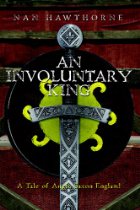 An Involuntary King: A Tale of Anglo Saxon England by Nan Hawthorne
An Involuntary King: A Tale of Anglo Saxon England by Nan Hawthorne
Paperback: 648 pages
Publisher: BookSurge Publishing (September 3, 2008)
ISBN-10: 1419656694
An Involuntary King: A Tale of Anglo Saxon England by Nan Hawthorne is an historical fiction novel set in Anglo-Saxon medieval England that follows the fictional character of King Lawrence of Crislicland, whose kingdom is thrown into turmoil with the deaths of his father and brother. Lawrence is thrust into a role of leadership at a young age, where he must learn how to be a king and how to deal with those who still pose a threat to his throne, namely his own cousin and a Breton mercenary, Elerde, who has personal aspirations besides the crown of Crislicland.
Elerde is one of the most complex and interesting characters in the novel. His love for the king’s wife Josephine drives a wedge between Lawrence and the Breton, and eventually Lawrence sends Elerde away after an incident that forever changes the relationship between the king and his solder. Nan obviously has a deep understanding of her characters, and rightly so considering the lifetime she has put in to getting to know them. While I did feel some of the characters deserved a bit more attention and fleshing out — for the most part, you either like the character or dislike the character, there is very little gray area that leads you to question his/her motives or integrity or honor, except for Elerde — despite this, Nan still preserves an engaging and active story, which moves at a fluid pace that will keep you turning the pages.
The protagonist, King Lawrence, is one of the characters that is a bit lacking, in my opinion, a character that is obviously hardened by war and difficult to get to know, even though he does show a more sensitive side around his wife Josephine. The secondary characters, Elerde and Rory and Shannon and Josephine, and their storylines are more entertaining, and I kept finding myself wanting the story to return to them when it switched from their perspectives. Elerde, in fact, could probably stand alone as a protagonist in his own novel.
A few weaker areas of the novel include the dialogue among characters and character perspectives. I felt the dialogue was a bit forced and unnatural at times, sometimes used as a crutch to fill in back-story or obviously reveal something about a character (telling not showing) where exposition might have worked better or just re-thinking the dialogue entirely. As far as character perspectives, the story, at times, seemed to jump from one character to another with no obvious delineation for the reader, or simply jumping to an omniscient narrator in order to feed the reader historical information, for example. This made parts of the novel difficult to follow.
Overall, I think Nan does a wonderful job with the story — pacing and flow and organization — and she most certainly has a real passion for her characters, which is evident by you wanting to know more about them after you have finished reading the novel.
Rating: 3 stars